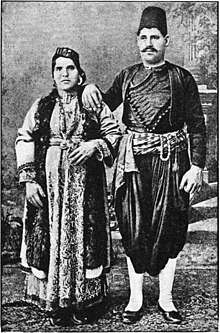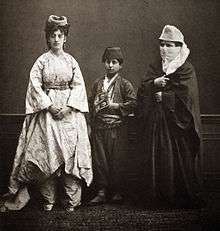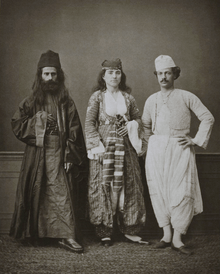Turkish salvar
Turkish şalvar (pronounced shalvar, Turkish: [ʃalˈvaɾ]), Turkish trousers or dimije are traditional baggy trousers gathered in tightly at the ankle. Men may wear the traditional loose coat, called a jubba, over the şalvar. Mustafa Kemal Atatürk changed the dress code in Turkey in the 1920s as part of his reforms. However, men and women still wear the şalvar in many areas of Turkey, indifferent to social status.[1]
Similar pants in other cultures include the tshalvar, schalwar, salwar kameez, kaccha, patiala salwar, shintijan, sirwal, sharovary, aladdin pants, balloon pants, drop crotch pants, pantaloons, zouave, pluderhose and pumphose.

.jpg)
Female dress
The traditional clothing for women of Turkey includes the şalvar which is usually worn with upper garments of varying styles and lengths. The traditional şalvar suits are a part of Turkey's culture back to the Ottoman era.[2] The şalvars are of varying degrees of bagginess and are gathered at the ankle.[3] Bright colours and flowered prints are favoured by rural women.[4] The total female ensemble includes the gömlek (chemise), şalvar and entari (robe).[5]
 Studio portrait of models wearing traditional clothing from Istanbul, Ottoman Empire
Studio portrait of models wearing traditional clothing from Istanbul, Ottoman Empire Cyprus 19th century Turkish costumes
Cyprus 19th century Turkish costumes Turkish traditional fashion
Turkish traditional fashion Turkish traditional fashion
Turkish traditional fashion- Turkish national costume
 Turkish girl wearing red dress
Turkish girl wearing red dress
Male dress
The traditional male dress includes the şalvar, yelek (vest) and cebken (jacket).[6] The men's salvar is popular in eastern Turkey, especially in the districts of Cilicia, Urfa and Diyarbakir.[7]
 Turkish Trousers with over the calf socks
Turkish Trousers with over the calf socks Samovar bearer in Istanbul
Samovar bearer in Istanbul
See also
- Knickerbockers
- Bloomers
- Harem pants
References
- Miller, Louise R (1998), Turkey: Between East and West
- The Report: Turkey 2008. The Oxford Business Group
- Schneider, Dux (1975) Turkey
- Gale Group (1999) Reference Library of Arab America: Countries & ethnic groups, Kuwait to United Arab Emirates
- Scarce, Jennifer M (2014) Women's Costume of the Near and Middle East
- Quataert, Donald Consumption Studies and the History of the Ottoman Empire, 1550-1922: An Introduction
- Sinclair, T.A. (1989) Eastern Turkey: An Architectural & Archaeological Survey, Volume I, Volume 1